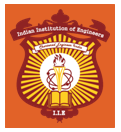THE ACADEMIC PROGRAMME OF THE INSTITUTION MAINLY CONSISTS OF SECTIONS ‘A & B’ EXAMINATIONS, POPULARLY KNOWN AS THE AMIIE EXAMINATION.
AMIIE in Mechanical Engineering
Information For:
- Home
- Examination
- R&D
- Application Status
- Apply Membership Online
- RTI Information & Reply
- Awards
- Become Student's Chapter
- Online Verification
- Placement Service
- Alumni Association
- Approval & Recognition
- AMIIE(B.Tech./B.E.)
- DIPIIE-DMIIE-TMIIE(Diploma)
- List of Student's Chapter
- Our Vision
- Circular/Notice/Tender
- Hall Ticket
- Examination Result
- Vacancy & Career
- Global Linkage
- Downloads
Key Highlights of the AMIIE
- Project based learning through industry collaborations.
- Focus on skill building & practical implementations.
- Interactive sessions with industry experts through Student's Chapter.
About
Mechanical engineering is one of the main engineering disciplines that include the application of laws of physics for designing, analyzing and manufacturing of mechanical systems. Mechanical engineers design and assemble engines and power plants, structures and vehicles of all sizes. Mechanical engineers must have a solid understanding of base concepts such as mechanics, kinematics, fluid mechanics and energy. Mechanical engineers utilize the core principles in the field to design and examine motor vehicles, watercraft, aircraft, heating and cooling systems, robotics, industrial equipment and machinery, medical devices and more. Mechanical engineering offers a solid base for professional engineering practice, and further study in mechanical engineering or many other related fields.
Career
Mechanical engineers typically do the following:
- Analyze problems to see how mechanical and thermal devices might help solve a particular problem
- Design or redesign mechanical and thermal devices or subsystems, using analysis and computer-aided design
- Develop and test prototypes of devices they design
- Analyze the test results and change the design or system as needed
- Oversee the manufacturing process for the device
Job Prospects
Mechanical engineering is one of the top most career choices made by students in India. There are a lots of career opportunities in this field for young aspirants. Graduates from this field are mainly employed in manufacturing firms. Mechanical engineers can seek employment in private or public sector industries of various types. They can also find job in government departments such as CPWD, defense, PWD, posts and telegraphs. Other sectors such as electronics, chemical, power plants, steel plants, agricultural, space research institutes, automobile and aeronautical as well as the railways, need mechanical engineers to design and maintain their machinery.
Candidates with postgraduate degree or with additional management degree can find work in executive and managerial positions. In agricultural division, mechanical engineers play a major role by establishing service centers for maintenance of pump sets, tractors, electric motors, oil engines and other agricultural equipments. Candidates who are interested in research activities can work with many public/private sectors research organizations. Professionals in this career can also opt for teaching jobs in universities and colleges. Postgraduate students with experience can also seek employment in abroad countries.
Remuneration
Engineers working in government departments can earn around Rs. 8,000 to Rs. 15,000 every month at beginner level while at superior level it might go up to more than Rs 20,000 every month. Professors and lecturers of technical colleges are getting as fixed by UGC. In private companies where mechanical engineers are generally sought, their salaries are fairly high ranging from Rs. 30,000 to Rs. 60,000 depending upon qualification and experience. Consultancy job in mechanical engineering is also a highly lucrative career path. Consultants are earning handsome salary depending upon number and nature of clients they have.
Section-A
Section-B
- THEORY OF MACHINES
- METAL CUTTING AND TOOL DESIGN
- CONTROL SYSTEM
- CNC PROGRAMMING
- OPERATION RESEARCH
- STRENGTH OF MATERIALS
- INDUSTRIAL ENGINEERING AND PRODUCTION MANAGEMENT
- DESIGN OF MACHINE ELEMENTS
- HYDRAULIC MACHINES
- INDUSTRIAL ECONOMICS AND MANAGEMENT
- METROLOGY & QUALITY CONTROL
- I.C. ENGINES & AUTOMOBILE ENGINEERING
- FINITE ELEMENTS METHODS IN ENGINEERING
- REFRIGERATION AND AIR CONDITIONING
- MACHINE TOOL DESIGN
- COMPUTER AIDED GRAPHICS AND PRODUCT DESIGN
- MANAGEMENT OF TECHNOLOGY
- MECHATRONICS
- PROJECT WORK
What Is AMIIE?
Full form of AMIIE is “Associate Member of the Indian Institution of Engineers”. AMIIE is a professional certification given by Indian Institution of Engineers (IIE).
